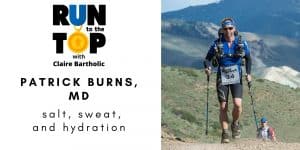Stephanie Kay Atwood – A Closer Look at How to Qualify for Boston
In this week’s episode our host, Stephanie Kay Atwood, expands on her marathon training method and goes even deeper into what the plan looks like and how it has helped athletes qualify for Boston. This week focuses on 3 quality runs per week and introduces early training nutrition as an additional and essential part of effective training.
Three quality runs per week
The response to last week’s episode was so great, she took the opportunity to elaborate further on what the 3 QUALITY running workouts per week are and the rationale behind them, other workouts and strength training to do on non-running days, and the importance of rest and nutrition, especially leading
into
taper. She is continuing to offer her pace chart for free to anyone who emails her; a link is included below.
We also learn a bit more about the area in Mexico where Stephanie is visiting for the next few months as well as what she has been up to recently.
Add in good nutrition from the beginning of your training
If you haven’t yet had a chance to listen to last week’s episode, please do as you will get more value from this deeper look into the training with that context. In this episode, Stephanie grounds her training plan to reality by providing an example of a hypothetical runner who is using this training method to improve their marathon results and earn a prized Boston Qualification.
By using run-walk, over-distance training and only 3 days of running / week, Stephanie and other athletes she has coached have successfully BQ’d using this training method.
Stephanie has been running for about 50 years and coaching for over 30. She has national certifications as a nutritionist, personal trainer, and distance run coaching with Road Runners Club of America (RRCA) and US Track & Field (USATF) Levels 1 and 2. And she has qualified for Boston multiple times since 1976.
These two podcast episodes may just change the way you approach your marathon training.
Highlights:
7:15 Meet our hypothetical athlete and another great qualification strategy
Starting with the pace chart
8:42 Establishing our athlete’s baseline
10:50 Accurate marathon pace extrapolation
11:43 Using shorter distance races to assess BQ readiness
12:38 How close is close enough to start focusing on BQ’ing
13:29 Keys to success even if it takes some time
14:37 The importance of Workout 1: Speed Training
15:24 The importance of Workout 2: Tempo Run
16:14 The importance of Workout 3: Planned Marathon Pace (PMP)
Week 1 Training Plan Details
17:30 Day 1: Rest
17:53 Day 2: Strength and Core
18:46 Day 3: Track Workout – Absolute Speed, Max Effort
19:57 Day 4: Rest or Flexibility
20:22 Day 5: 4 mile Tempo Race Pace
21:06 Day 6: Rest or Strength / Core depending on resting heart rate
22:10 Day 7: Running Workout – 90 minutes at PMP
22:53 Rationale and ‘what if’ training adjustments
Week 10 Training Plan Details (Incorporating Over-Distance Training)
24:14 Why Over-Distance Training
24:50 Day 1: Rest
24:58 Day 2: Strength and Core
25:08 Day 3: Track Workout – Short Tempo Pace
25:50 Day 4: Rest or Flexibility
26:02 Day 5: 4 mile Tempo Race Pace
26:27 Day 6: Rest or Strength / Core depending on resting heart rate
26:43 Day 7: Running Workout – Endurance Run, 20 Miles at PMP + 30 seconds 2 miles at any pace (
including walking
)
29:18 Quick Recap
29:59 Periodization Review
31:28 Why rest is essential and resting heart rate as a training guide
31:58 The importance of cross training
33:22 Why Over-Distance and what to learn from trail-runners
Nutrition During Training
34:39 Rethinking Nutrition
36:51 Macro and Micro Nutrients
38:19 Balancing energy sources
39:30 Converting grams to calories; Protein vs. Carbs vs. Fats
41:09 Nutrition early on in training
41:40 Middle Training Nutrition
43:15 Caffeine
Final Thoughts
44:33 Race Day Bio-Strategy
45:46 Multiple goals per race
46:51 Listen to your body
Quotes by Stephanie:
“Real food vs. processed food is the way to go. The closer you can get to the source and the closer you can be to the natural food, the more likely you are to get the full nourishment and the full energy that you want out of it.”
“Cross training is an essential part of being a good runner and staying uninjured, so please don’t devalue the days when you’re not running and when you’re allowing your body to be strong in other ways.”
“We’re upping the distance, but dropping down the time. But we’re not just dropping down to any time; we’re working toward a more specific goal and we’ve got a more specific training plan to make that happen.”
“Because we’re doing three focused runs per week, (BQ’ing) is very possible for you to try to accomplish and, if not, then you have a really good base in order to keep working towards it as the years go by. This is not something that has to happen the first time.”
Take a Listen on Your Next Run
Want more awesome interviews and advice?
Subscribe to our iTunes channel
Mentioned in this podcast:
Run To The Top Winners Circle Facebook Community
2019 Boston Qualifying Standards
Email Stephanie for your free pace chart:
We really hope you’ve enjoyed this episode of Run to the Top.
The best way you can show your support of the show is to share this podcast with your family and friends and share it on your Facebook, Twitter, or any other social media channel you use.
If more people who know about the podcast and download the episodes, it means I can reach out to and get through to the top running influencers, to bring them on and share their advice, which hopefully makes the show even more enjoyable for you!
—
Thank you for listening to Run to the Top!








